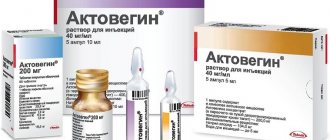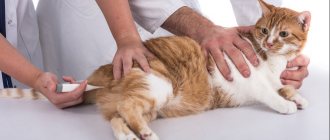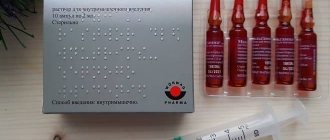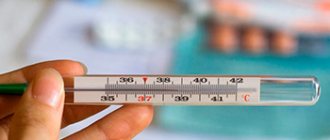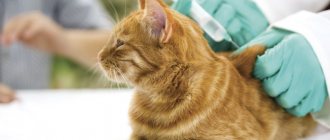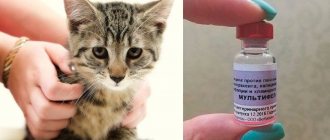Vaccine against feline leukemia Vaccination against feline viral leukemia When to vaccinate cats against leukemia Complications after vaccination against leukemia Feline viral leukemia (feline leukemia Virus or FeLV) is a common infectious disease of cats caused by an RNA-containing retrovirus. The pathological process is associated with the emergence and subsequent malignant proliferation of hematopoietic tissue. In this case, new cell forms are formed, replacing and interfering with the maturation of healthy blood cells. The disease is widespread throughout the world; cats at risk are those living in crowded conditions - in shelters and nurseries, all cats on their own (including country houses). In some cases, cats can fight this virus on their own (eliminate), and resistance also increases with age, however, upon repeated contact with carriers of leukemia, transmission of the disease is quite likely. When clinical signs appear, the prognosis is unfavorable, almost always fatal. In the early stages (from several weeks to several years), the disease can occur latently, without clinical symptoms, what exactly is associated with the activation of the virus is still unknown, but it is known that stress, unfavorable conditions, changes in living conditions and feeding play a role.
Vaccine against feline leukemia
There are several different types of feline leukemia virus vaccines. In Russia, only the recombinant viral vaccine is most often used (manufactured by Purevax, brand name Purevax FeLV). The Feline Leukemia Viral Vaccine is a non-essential vaccine as recommended by WSAVA, but should be recommended for all cats that are at risk of being exposed to infected animals. Most often, cats that can freely walk outside are infected, but even living with a former street cat carries a risk of infection. Therefore, if you have cats that may be carriers of the virus, it is recommended to vaccinate your pets.
In shelters and nurseries, a very careful attitude to the prevention of infection is required; in most cases, leukemia is transmitted to kittens from infected parents.
Do I need to be vaccinated against feline leukemia virus?
As with other vaccinations, the pros and cons must be weighed.
Transmission of the virus from one cat to another requires quite a long period of direct contact with an infected cat: mutual licking, biting, deep scratches, touching each other's noses, sharing food and water bowls. The virus is transmitted through saliva. Kittens are easily infected with viral leukemia, and the immunity of cats older than one year is strong enough to resist the virus.
The AAFP (Association of Feline Veterinarians) recommends that all kittens be vaccinated against FLV, and adult cats only if you know for sure that your cat will come into contact with an infected cat. But this situation is quite rare: only if you take an infected animal into your home and know about it in advance. Other veterinarians, such as D.V.M. Lisa Pearson believes that kittens should be treated the same way as adult cats.
If your kitten or cat never goes outside (free-range), if there are no other cats running into your house that might encounter yours, then the likelihood of becoming infected with the feline leukemia virus is extremely low. All cats entering the household must be pre-tested for FLV.
The feline leukemia virus vaccine is relatively effective but does not protect 100% of all vaccinated cats and is not considered a core vaccine. If you are unsure whether to vaccinate your cat against viral leukemia, consider how likely your cat is to be exposed to a potentially infected cat.
Important: the vaccination against viral leukemia does not affect the results of tests for the detection of feline leukemia virus (ELISA, ELISA or PCR).
Vaccination against feline leukemia virus
Cats that are already carriers of the FeLV virus cannot be vaccinated. Therefore, before vaccination it is necessary
conducting serological testing for the presence of antibodies to the leukemia virus. It is possible to guarantee that a cat is not a carrier only in relatively rare cases - for example, kittens from parents with negative test results who have not had contact with other animals will also have a negative FeLV status. In our clinic in Moscow, testing is carried out using rapid tests, so it can be carried out immediately on the day of the intended vaccination, it does not take much time.
What can you do to prevent your cat from getting leukemia?
Prevention of this disease is timely vaccination against leukemia, limiting access to the street and contact with other animals.
Vaccination can begin at 8–9 weeks of age, with the second dose (which is required for all FeLV vaccines) given 2–4 weeks later. Booster vaccination against FeLV should be repeated at the age of 1 year and then no more than once every 2-3 years for cats at risk.
Before vaccination against feline leukemia, it is necessary to do a blood test for carrier status, since vaccination of an infected animal is not effective!
When are cats vaccinated against leukemia?
The first vaccination for cats at risk, especially in shelters, can be recommended to vaccinate kittens as early as 8 weeks of age, with mandatory revaccination after 2-4 weeks.
Primary vaccination against leukemia is always carried out twice with an interval of no more than 4 weeks. If 5-6 weeks pass after the first vaccination, you will need to be vaccinated again and revaccinated after 2-4 weeks, otherwise a sufficiently strong immunity will not be formed. The same rule applies to adult animals - the first vaccination is always double. You can then revaccinate annually. There is information that cats become more resistant to infection with age, and after 3 years they can be revaccinated against FeLV every 3 years. However, clinically significant immunity when vaccinated with the Purevax FeLV vaccine available in Russia was determined to last 12-14 months, so we recommend annual revaccination. Repeated revaccinations (except for the first) are carried out once.
A single primary vaccination against feline leukemia will not provide protection against the disease.
Vaccination is carried out only in clinically healthy animals. Before vaccination, the cat must be examined by a doctor and carried out (at the first vaccination) serological testing. Let us repeat once again that for cats that are already carriers of the virus, vaccination against leukemia is useless (in some cases it may be harmful).
The vaccine is administered subcutaneously.
Video of cat vaccination against leukemia:
Vaccination of cats against VIRAL LEUKEMIA
Feline viral leukemia: what is it?
Feline viral leukemia (viral leukemia, FLV or FeLV) is a chronic infection that causes serious illness in the body of animals due to disruption of the immune system: secondary infections (bacterial, viral, fungal, parasitic), tumors (mainly lymphomas and leukemia) and diseases red bone marrow (anemia, pathology of leukocytes and platelets).
VLK is transmitted to a pet from other cats through close contact, mainly with saliva (playing, licking, biting, fighting, feeding with milk), so animals that have access to the street are primarily predisposed to the infection. Kittens are especially susceptible and get seriously ill.
At the moment there are no drugs that can completely cure this infection.
Most often, VLK occurs without any symptoms until the virus causes a serious and often incurable illness.
The main method of control in this case is prevention!
You can protect your cat with a vaccine!
Does my cat need to be vaccinated against viral leukemia?
Such protection is recommended and necessary for kittens, as well as all cats with access to the outdoors and cats living with another FLV-infected pet if isolation is not possible. Despite the fact that any vaccination cannot guarantee 100% prevention of the disease, vaccination has helped reduce the incidence of this dangerous latent infection among cats in other countries of the world and, accordingly, prevent many diseases associated with this virus.
However, feline leukemia virus is not a mandatory vaccination according to the recommendations of the WSAVA (International Small Animal Veterinary Association), because exclusively pets that have absolutely no contact with other cats cannot become infected with FLV during their lifetime.
How is vaccination against feline leukemia virus carried out?
Vaccination of clinically healthy animals is carried out twice with an interval of 3-5 weeks, starting from 8 weeks of age, then annually. This procedure can be combined with the main vaccination of cats (against rabies, viral rhinotracheitis, calicivirus and panleukopenia) when using drugs from the same manufacturer. Before each vaccination against FLV, it is necessary to conduct a test for the carriage of the virus, since it cannot protect an already infected animal (the vaccine will not harm, but will be useless for a cat carrying FLV). A sample of the cat's blood is required for the test. The rapid method test takes 15-30 minutes, and a negative result of such an analysis is enough to make a decision about vaccination. Express analysis can be supplemented with PCR testing to more accurately exclude VLK.
Unfortunately, the need for blood tests is often the reason for the refusal of the animal owner to vaccinate against FLV; on the other hand, it is worth remembering that determining the carriage of chronic viral infections (CVI) such as FLV and FIV (feline immunodeficiency virus) is an integral part of the screening examination any cat during its life.
What complications can there be?
Vaccination against FLV carries the same risks as regular vaccination against major feline infections (low risks of deterioration in general condition, development of an allergic reaction, post-injection sarcoma). Vaccination does not lead to changes in the results of tests for VLK in the future (this has been proven by research).
We strongly recommend that you pay attention to the possibility of protecting your cat from FLV by vaccination and the need to screen all cats for chronic viral infections. Caring for the health of pets is in our hands.
Complications after vaccination against leukemia
For cats, complications after vaccination may manifest themselves in the form of a small lump at the site of vaccine administration - it is not dangerous and will disappear on its own after a while. In rare cases, the vaccine may cause individual intolerance (allergic reaction), which is treated symptomatically. This reaction usually appears immediately after the allergen enters the body, so the doctor at the clinic can quickly take action. Another complication typical for cats is post-injection sarcoma, which, unfortunately, can develop at the site of any injection. This is a rare complication (according to various sources, one animal out of 6-12 thousand), however, there are recommendations for vaccination not in the withers area, but in the distal limbs or tail. It is also recommended to change injection sites for vaccinations annually. You can leave information about the localization in the passport so that when revaccinating a year later, there will be no questions about where the cat was vaccinated.
(c) Veterinary center for the treatment and rehabilitation of animals “Zoostatus”. Varshavskoe highway, 125 building 1. tel. 8 (499) 372-27-37
Is feline leukemia dangerous for people?
The leukemia virus is not known to be transmitted to humans. However, cats with this disease can carry other infections that are transmitted to people with weakened immune systems (for example, patients with HIV/AIDS, people undergoing chemotherapy, etc.). Therefore, cats with leukemia should be kept under observation. If symptoms of any disease become apparent, they should be taken to a veterinarian for immediate examination. This is necessary both for the cat itself and for any person living with it.
Cats with the chronic form usually appear healthy. And they are especially dangerous because no one suspects that a pet is a carrier and distributor of the virus.
Therefore, it is recommended to diagnose this disease in cats that are at risk or have owners with weakened immune systems.
Treatment of cats
Most often, the prognosis for the owner is disappointing. If the diagnosis is confirmed, it is recommended to euthanize the cat so that it is not a carrier of a dangerous virus and does not threaten the lives of other pets.
To ensure that this disease does not endanger the life of your pet, we strongly recommend that you come to the veterinary clinic for examinations more often and carry out the preventive measures recommended by doctors. This is the only way your cat will live long and make you happy every day!
It is important to understand!
To date, there is no effective treatment for infectious leukemia. For treatment, specialists prescribe therapeutic measures that will improve the patient’s condition slightly, but will still prolong his life.
Therapeutic treatment is aimed at supporting the sick animal and preventing secondary diseases. In treatment, specialists include: vitamins, antibiotics, anticancer drugs and other drugs that are prescribed individually for each person.
Preventive actions
This disease is considered incurable; its symptoms do not allow doctors to identify the disease at an early stage and this leads to massive damage to healthy animals. To prevent the disease, you need to carry out the following prevention:
- Vaccination is an effective method, but, unfortunately, not in all cases. It is more correct to conduct a test for the presence of antibodies to the pathogen before vaccinating a kitten.
- We recommend that you carry out the first vaccination from 12 weeks onwards annually with the vaccine against feline viral leukemia - Purevax FeLV
- Avoid contact with sick animals;
- Monitor the blood of pets when kept in groups;
- Disinfect the premises more often.
The leukemia virus does not exist in the environment for a long time; it is destroyed by exposure to even the weakest disinfectant. To completely destroy a dangerous pathogen, it is enough to regularly wet clean the house using soapy water and then your pets will be safe!
